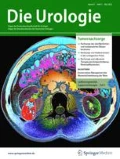Zusammenfassung
Aufgrund der geringen Inzidenz des Peniskarzinoms ist die Datenlage zu molekularen Markern sehr begrenzt. Es finden sich erste Untersuchungen zu prognostischen Markern bzgl. einer Lymphknotenmetastasierung bzw. prognostische Marker bzgl. eines Ansprechens auf eine Chemotherapie oder einer Target-Therapie. Aufgrund der geringen Fallzahlen ist jedoch eine ausreichende Absicherung der Datenlage bzgl. einer möglichen Therapieempfehlung nur sehr begrenzt möglich. Ziel sollte daher für die Zukunft sein, alle Patienten, die einer systemischen Therapie unterzogen werden, im Rahmen von Studien zu betreuen, um die Datensituation hier zu verbessern.
Abstract
Due to its low incidence there is only very limited data concerning molecular markers in penile cancer. Recent studies show potential prognostic markers for lymph node metastasis, survival and response to chemotherapy or targeted therapy. Nevertheless the number of patients in the studies is very limited. Therefor clear recommendations for clinical decisions remain very weak. Patients with metastatic disease should be treated in clinical trials with translational biomarker research to improve the molecular tumor board in the future.
Literatur
Verwendete Literatur
Davidsson S, Carlsson J, Giunchi F, Harlow A, Kirrander P, Rider J, Fiorentino M, Andrén O (2019) PD-L1 expression in men with penile cancer and its association with clinical outcomes. Eur Urol Oncol 2(2):214–221
Weiterführende Literatur
Jemal A, Siegel R, Ward E, Murray T, Xu J, Thun MJ (2007) Cancer statistics. Ca Cancer J Clin 57:43–66
Hakenberg OW, Compérat EM, Minhas S, Necchi A, Protzel C, Watkin N (2015) EAU Guidelines on penile cancer: 2014 update. Eur Urol 67(1):142–150
Kakies Ch, Lopez-Beltran A, Comperat E, Erbersdobler A, Grobholz R, Hakenberg OW, Hartmann A, Horn LC, Höhn AK, Köllermann J, Kristiansen G, Montironi R, Scarpelli M, Protzel C (2014) Reproducibility of histopathologic tumor grading in penile cancer—results of a European project. Virchows Arch 464(4):453–456
Maier S, Wilbertz T, Braun M, Scheble V, Reischl M, Mikut R, Menon R, Nikolov P, Petersen K, Beschorner C, Moch H, Kakies C, Protzel C, Bauer J, Soltermann A, Fend F, Staebler A, Lengerke C, Perner S (2011) SOX2 amplification is a common event in squamous cell carcinomas of different organ sites. Hum Pathol 42(8):1078–1088
Poetsch M, Hemmerich M, Kakies C et al (2011) Alterations in the tumor suppressor gene p16(INK4A) are associated with aggressive behavior of penile carcinomas. Virchows Arch 458:221–229
Protzel C, Knoedel JE, Zimmermann U, Klebingat KJ, Giebel J, Woenckhaus C (2004) Strong expression of proliferation marker Ki67 predicts lymph node metastasis in patients with penile cancer. J Urol 171:309
Protzel C, Kakies C, Kleist B, Poetsch M, Giebel J (2008) Down-regulation of the metastasis suppressor protein KAI1/CD82 correlates with occurrence of metastasis, prognosis and presence of HPV DNA in human penile squamous cell carcinoma. Virchows Arch 452:369–375
Protzel C, Kakies C, Poetsch M, Giebel J, Wolf E, Hakenberg OW (2009) Down-Regulation of metastasis suppressor gene nm23-H1 correlates with the occurence of metastases and poor prognosis in penile squamous cell carcinoma. J Urol 181:202
Poetsch M, Schuart BJ, Schwesinger G, Kleist B, Protzel C (2007) Screening of microsatellite markers in penile cancer reveals differences between metastatic and nonmetastatic carcinomas. Mod Pathol 20:1069–1077
Hartz JM, Engelmann D, Fürst K, Marquardt S, Spitschak A, Goody D, Protzel C, Hakenberg OW, Pützer BM (2016) Integrated loss of miR-1/miR-101/miR-204 discriminates metastatic from nonmetastatic penile carcinomas and Can predict patient outcome. J Urol 196(2):570–578
Protzel C, Richter M, Poetsch M et al (2011) The role of annexins I, II and IV in tumor development, progression and metastasis of human penile squamous cell carcinomas. World J Urol 29(3):393–398
da Cunha IW, Souza MJ, da Costa WH, Amâncio AM, Fonseca FP, Zequi Sde C, Lopes A, Guimarães GC, Soares F (2016) Epithelial-mesenchymal transition (EMT) phenotype at invasion front of squamous cell carcinoma of the penis influences oncological outcomes. Urol Oncol 34(10):433.e19–433.e26
Fenner F, Goody D, Protzel C, Erbersdobler A, Richter C, Hartz JM, Naumann CM, Kalthoff H, Herchenröder O, Hakenberg OW, Pützer BM (2018) E2F1 signalling is predictive of chemoresistance and Lymphogenic metastasis in penile cancer: a pilot functional study reveals new prognostic biomarkers. Eur Urol Focus 4(4):599–607
Dorff TB, Schuckman AK, Schwartz R, Rashad S, Bulbul A, Cai J, Pinski J, Ma Y, Danenberg K, Skinner E, Quinn DI (2016) Epidermal growth factor receptor, excision-repair cross-complementation group 1 protein, and thymidylate synthase expression in penile cancer. Clin Genitourin Cancer 14(5):450–456
Zargar-Shoshtari K, Sharma P, Djajadiningrat R, Catanzaro M, Ye DW, Zhu Y, Nicolai N, Horenblas S, Spiess PE (2016) Extent of pelvic lymph node dissection in penile cancer may impact survival. World J Urol 34(3):353–359
Zargar-Shoshtari K, Djajadiningrat R, Sharma P, Catanzaro M, Zhu Y, Nicolai N, Horenblas S, Spiess P (2015) Establishing Criteria for bilateral pelvic lymph node dissection in the management of penile cancer: Lesson learned from an international study. J Urol 194(3):696–701
Lughezzani G, Catanzaro M, Torelli T, Piva L, Biasoni D, Stagni S, Crestani A, Guttilla A, Raggi D, Giannatempo P, Necchi A, Pizzocaro G, Colecchia M, Salvioni R, Nicolai N (2014) J Urol 191(4):977–982
Necchi A, Lo Vullo S, Perrone F, Raggi D, Giannatempo P, Calareso G, Nicolai N, Piva L, Biasoni D, Catanzaro M, Torelli T, Stagni S, Togliardi E, Colecchia M, Busico A, Gloghini A, Testi A, Mariani L, Salvioni R (2018) First-line therapy with dacomitinib, an orally available pan-HER tyrosine kinase inhibitor, for locally advanced or metastatic penile squamous cell carcinoma: results of an open-label, single-arm, single-centre, phase 2 study. BJU Int 121(3):348–356
Author information
Authors and Affiliations
Corresponding author
Ethics declarations
Interessenkonflikt
C. Protzel und O.W. Hakenberg geben an, dass kein Interessenkonflikt besteht.
Für diesen Beitrag wurden von den Autoren keine Studien an Menschen oder Tieren durchgeführt. Für die aufgeführten Studien gelten die jeweils dort angegebenen ethischen Richtlinien.
Rights and permissions
About this article
Cite this article
Protzel, C., Hakenberg, O.W. Molekulares Tumorboard Peniskarzinom – eine Herausforderung. Urologe 58, 774–780 (2019). https://doi.org/10.1007/s00120-019-0973-7
Published:
Issue Date:
DOI: https://doi.org/10.1007/s00120-019-0973-7

